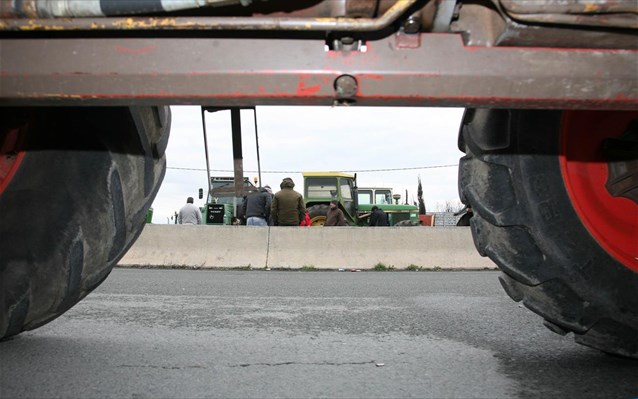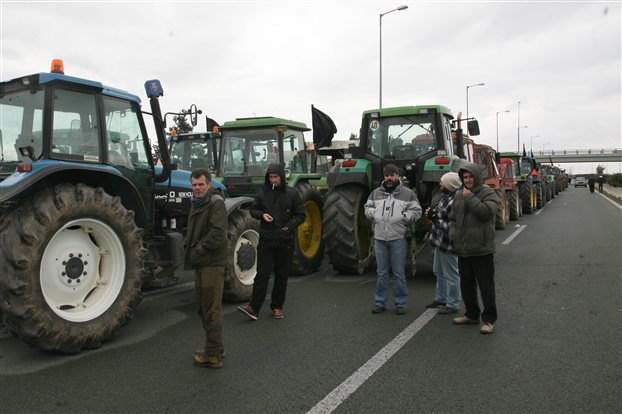Photos: naftemboriki.gr
With a main slogan against the expected tax on their income, the Greek farmers have already started their tractors and they are ready to begin mass road blockades. As GRReporter wrote a few days ago, they protest against the taxation of their income from the first euro, after their long dependence on European grants and adherence to local professional interests.
By decision of the Ministry of Finance, as of 1 January 2014, farmers are required to keep books of income and expenses. Only those who have gross incomes below 10,000 euro a year and receive benefits for the single area payment of up to 5,000 euro are exempt from this obligation. With their protest, farmers insist on applying the exception to turnover of up to 40,000 euro and exempting the family income of up to 20,000 euro from taxation.
Another demand of the industry is to use excise duty free naphtha and to reduce the night rate of electricity. They also want easier terms to obtain bank loans, 30% cuts of older loans of up to 20,000 euro and guarantees that their houses and lands worth up to 300,000 euro will not be threatened by auctions organized due to their outstanding tax obligations.
The agricultural unions also insist on the following: abolishing the restrictions imposed by the single agricultural policy of the European Union for the period 2015-2020, allocating subsidies for feed to small and medium-sized livestock farms and on imposing minimum guaranteed prices for agricultural and livestock products.

The farmers from Thessaly region have invited the public to join their blockade of the Athens-Thessaloniki road near Nikea village during the protest rally, which they will organize next Sunday. On Saturday, a general meeting with representatives of the roadblocks throughout the country will be held in the cultural centre of the village. Farmers unite around the demand to meet with Minister of Finance Yiannis Stournaras and with the leaders of all political parties.
On Friday, general secretary of the Communist Party of Greece Dimitris Koutsoumbas will visit the blockade of Nikea near Larissa. Traditionally, it is the largest one and the centre of joint solutions. Local union leader Vangelis Boutas, who has been heading the protests for decades already, is a member of the party and its nominee for the upcoming elections for Members of the European Parliament.
Meanwhile, the farmers from Naoussa and Alexandria in the region of Imatia (northwestern Greece) are already on their way, with their tractors, to "Kouloura" junction. According to the representative of the local spontaneous movement of farmers Kostas Lioliopoulos, the procession is already 10 kilometres long. In statements for the Athens News Agency AMNA, he does not exclude the possibility of his colleagues holding a symbolic blockade of "Egnatia" highway today.
The farmers in the region of Serres are remaining in the streets of the villages for the time being and they are going to decide how they will continue their protests on Friday. According to their leader Yiannis Tourtouras, the number of protesters is steadily increasing. The farmers from Drama and Kavala have not planned a protest to date.

The Ministry of Agriculture on its part states that the discussions with farmers and the Ministry of Finance continue. Minister Athanassios Tsavtaris is clear that farmers must keep accounting books. According to him, this will limit the following violations of the law: "renaming" imported products Greek, the issuance of false invoices and all the machinations in connection with tax refunding.
It seems however that the Ministry tends to increase the non-taxable income. "This matter is under review. We will not be so strict in its definition. The Ministry of Finance has accepted our proposal to extend the limit by plus/minus 500-800 euro. The final decision will be taken there," said the Minister of Agriculture. His words do not sound convincing to farmers who have already started roadblocks.
Against this background, it is not surprising that young people who want to start agricultural activities are facing a pile of negative circumstances. Technical consultant of the Hellenic Union of Young Farmers Dimitris Michailidis states that in Greece there is no long-term strategic development plan that is consistent with its resources and capabilities.
"For example, cotton cultivation cannot be an advantage for Greece in view of the fact that the average utilized agricultural area is 47 acres whereas the average area in the EU is 1,500 acres and in Ukraine 18,000 acres," he states for the Greek "Naftemboriki" newspaper.

According to him, after 1981, when the policy of subsidies was enforced, clientelist relationships among farmers and the political system have formed, playing a continuous "intriguers’ game" related to the already traditional protests of farmers.
According to Michailidis, Greece’s agricultural strategy should be based on the following three main advantages of the country: high biodiversity, favourable climate and culture.